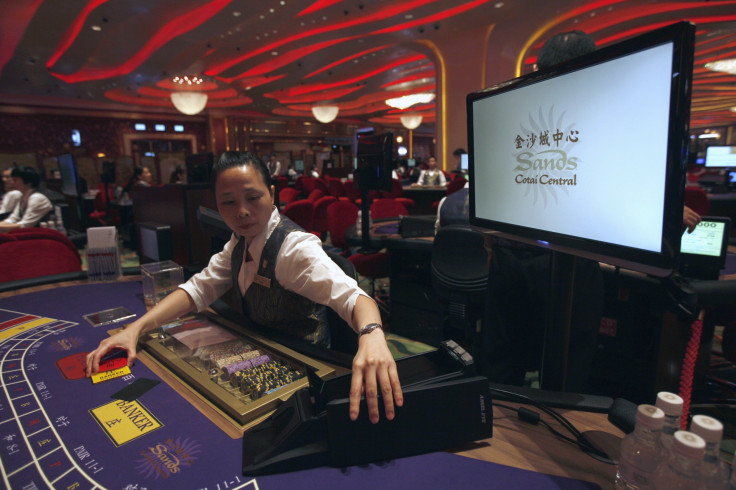Chinese Money Brings New Life To Las Vegas, But Macau's Casinos Are Suffering

With the glittering lights of the strip, boundless gambling options and Chinese-friendly hospitality, Las Vegas has become the playground for China’s wealthy mainlanders, who do not have the kind of fun Vegas offers back home.
And it's not just rich people. China’s increasingly wealthy middle class is buying into Las Vegas more than ever. From big development investments to filling seats at the slot machines, the Chinese are making their distinct mark on the desert city, and their money is following.
While many of Las Vegas’ old favorites still remain, a surge of Chinese influence and investment has changed much of the landscape. By day, Chinese visitors are seen toting around designer shopping bags; by night, occupying the Baccarat tables. During peak Chinese travel seasons, like during the Lunar New Year festival, Vegas’ biggest casinos all participate in promotional events including elaborate, themed displays and an abundant amount of auspicious (for the Chinese) red decorations.
According to the Las Vegas Sun, Chinese investors are bankrolling a chunk of a shiny $415 million luxury “nightclub-themed” resort, the SLS Las Vegas, located on the struggling North end of the Strip. About a quarter of the investment for the newest SLS outpost comes from foreign investment, most of which is Chinese. But it’s not just the SLS: Chinese money is backing other endeavors. Together with the famed Cirque de Soleil acrobatic performances and Celine Dion’s residency at Caesars Palace, a new Chinese-backed show, “Panda!” has also taken the stage with the help of Chinese investors. And another at the Venetian’s Palazzo is a Chinese-style acrobatic and martial arts performance that also features a giant cartoonish panda.
But while the flow of Chinese money is good news for the Strip, new regulations imposed by China’s government have stifled business in the other world-famous casino town: Macau, the ex-Portuguese city colony next door to Hong Kong.
Macau, also known as the “Las Vegas of the East,” is a special administrative zone on an island where gambling is legal, unlike on mainland China. Macau has seen its own share of Vegas-level investments, coming from Chinese billionaire Stanley Ho and Americans Sheldon Adelson and Steve Wynn, founder of Wynn Resorts Lts (NASDAQ:WYNN), among others.
According to a report by Businessweek, shares of the six largest publicly traded casinos, including Adelson’s Las Vegas Sands (NYSE:LVS) and Wynn’s Wynn Macau Ltd (HKG:1128), are struggling. Collectively, the six companies' shares dropped 20 percent last Friday, with Wynn Macau dropping 8.5 percent, the most in more than two years of being listed in Hong Kong. The decline is seen as a result of an announcement by Chinese authorities, saying they would tighten regulations on Chinese gamblers, ultimately limiting the amount of money that can be brought to the territory.
China’s limitations are prompted by concerns by the central government that tens of billions of yuan in illegal funds are being taken outside of China and laundered through casinos in a scheme called “card-swiping.” According to a report by the South China Morning Post, mobile users of the state-backed UnionPay payment service have been able to illegally obtain funds and use them for unauthorized dealings, while still making them appear as domestic transactions, avoiding local currency controls. Current restrictions allow tourists to bring 20,000 yuan, or roughly $3,200, into Macau and withdraw as much as 10,000 yuan a day at cash machines with each card they have. In order to skirt regulations, people pretend to buy luxury items at pawnshops using their debit cards, like the ones provided by UnionPay, and immediately resell them for local Macau pataca or Hong Kong dollars, effectively bringing in additional funds.
However, Macanese casinos are now hoping to strike gold with a new marketing plan focused on a “premium mass” market, rather than just China’s elite of wealthy people. Bolstering a market for ordinary gamblers, instead of just high-roller VIPs, could help shoulder revenue shortfalls caused by the new regulations. Bloomberg reports that Adelson’s Sands China (HKG:1928) has already converted 20 percent of its VIP tables to cater to middle-class gamblers.
© Copyright IBTimes 2024. All rights reserved.





















